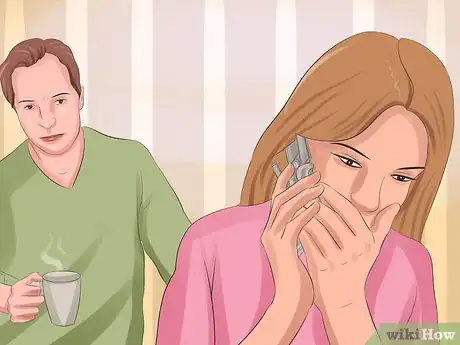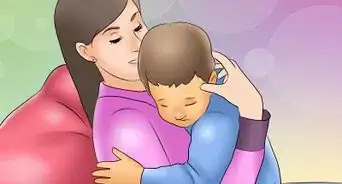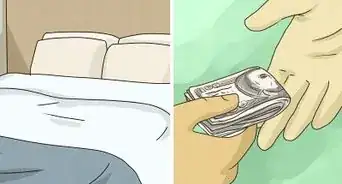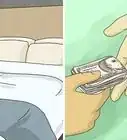wikiHow is a “wiki,” similar to Wikipedia, which means that many of our articles are co-written by multiple authors. To create this article, volunteer authors worked to edit and improve it over time.
This article has been viewed 58,311 times.
Learn more...
Remember the moment you first fell in love as a teenager? Your experience of first love is likely very similar to your teenager son or daughter’s first time falling in love. Once you get over the initial shock of knowing your teenager might be in a relationship or even be in love with someone else, consider how your experience of love at their age, and feel a sense of relief of having lived through it, just like your teen will. As a parent, use your past experiences to help your teen navigate their new experience with love, and help them cope with these new feelings as best as you can.
Steps
Supporting Your Teen
-
1Give them space to experience their first love. Your child will always be your child, even as they grow up, so you will always worry about them. But be supportive, give guidance and make an effort to be informed and involved in their life, rather than restrict or monitor everything they do.
- Giving them space to experience their first experience of love means letting them be responsible for their emotions and choices. Some of the first loves may end quickly, some may persist, but each relationship will teach your teen valuable lessons about how to be with someone else.
-
2Talk to your teen about who they are in love with. Have a conversation about what kind of person your teenager is in a relationship with. Ask them how they see the relationship, its virtues, and its flaws and why they think the relationship is special.
- You can also ask your teen’s friends what they think of the relationship, but do this casually as you do not want to interrogate your teen’s friends and be too aggressive about trying to find out more information on your teen’s partner. Your teen’s friends spend likely more time than you do with your teen, so they can see your teen and their partner in different situations and perhaps see a side of the relationship you may not have access to.
Advertisement -
3If it is appropriate, talk to your teen’s boyfriend or girlfriend directly. Invite your teen’s partner over for a family dinner or lunch to try to socialize with them and get to know them better. But always check with your teen before you invite their partner over, as you do not want to be too overbearing or disrespectful towards your teen.
-
4Build a relationship of trust with your teen. This is important because the more your teen trusts you, the more they will feel comfortable talking to you about their new relationship.[1]
- One way to build trust with your teen is to be calm and not overreact to your teen’s new relationship. Avoid asking too many questions, following their every movement and wanting to know everything.
- On the other hand, do not be indifferent and do not underestimate the relationship of your teen. Keep in mind that your teen is going through a very important emotional experience, much like your first experience of love.
-
5Ask your teen periodically about their relationship. If they are not willing to talk, do not force the conversation, but indicate to your teen that you are interested in what is going on in their life and want to be supportive of their new relationship.
- If your teen feels comfortable and supported rather than policed or judged, they will be more willing to talk with you and to listen to what you have to say. Listen and consult with your teen and offer advice only if they ask you for it.
Setting Boundaries
-
1Let your teen know when hugging and kissing with their partner is acceptable. Teenage love can be overwhelming so you may want to establish boundaries and limits to their physical interactions in front of others or in a common space.
- Make it clear when and where you think certain physical behaviors are acceptable or unacceptable. Talk to them if you feel comfortable with them kissing in front of other guests and/or other family members while having dinner together or while spending time together in a common space (watching TV after dinner, hanging out in the living room as a family, etc).
- Discuss which types of displays of affection are acceptable and not acceptable in public. For example, constantly kissing in front of strangers and ignoring their presence or too much PDA (public displays of affection) can be impolite or uncomfortable for others.
- Try to find a balance between what is acceptable and unacceptable. Give your teen advice on how to deal with public displays of affection, rather than simply chastising or scolding them.
-
2Encourage your teen to not let the relationship overwhelm other areas of their life. Other relationships in your teen’s life like their relationship with their family and with their friends are just as important as their new romantic relationship, so speak to them about how to balance out other areas in their life with spending time with their partner.[2]
- The relationship should not affect their success in school and in extracurricular activities. As well, time with friends is important to maintain, so remind your teen not to disregard their friends.
- If their commitment to others begins to suffer, talk to them about this. Encourage them to not neglect their other relationships. Have them make a schedule that includes time for other commitments, family, friends and of course, time with their first love.
-
3Establish boundaries on using the Internet and the phone. Your teenager will probably be obsessed with their new relationship and spend the whole day chatting online or on the phone with their boyfriend or girlfriend. Depending on how often your teen is spending on the Internet or the phone, set time limits on how long they can chat with their partner.
- Explain that they should be spending their time equally with their partner and doing activities with others.
-
4Be firm but fair. Do not be too lenient as you guide your teen in his relationship. Be consistent with your discipline but make sure that your rules are fair. Set a realistic curfew to follow and reasonable limits on their Internet and phone use.
Maintaining Open Communication
-
1Discuss your experiences of first love with your teen. This will give your teen some perspective on your experiences of the highs and lows of first love. Give them advice on the appropriate age for a serious relationship, how to act on a date, how to be a good boyfriend or girlfriend, how to build trust and communication in a relationship, and how to deal with the end of a relationship.
- Through conversations like this, you can provide support and assistance to your teen and make them feel like they are not alone in their feelings.
-
2Do not get discouraged if your child does not want to communicate with you. Some teens may not be open to talking about their relationship or their feelings, or to hearing your experiences of first love. Make it clear that if they ever do want to talk, you are always open to a discussion another time or further into their relationship.
- Let your teen know that you respect their desire for privacy and are always available if they ever want to talk.
-
3Notice if your teen starts to slip on their other commitments or goals. If your teen seems to commit too much time to the relationship and other relationships or commitments start to slip, this may be a good time to check in with the relationship to ask if something is wrong or if there are issues in your teen’s relationship they may want to talk to you about.[3]
- This way, you are trying to get information on the relationship in a helpful, supportive way, rather than a nagging or intrusive way.
-
4Discuss your expectations around your teen's boyfriend or girlfriend. Though you may not be able to control when your child falls in love, you can let them know what kind of expectations you may have for their partner’s behavior and your teen’s behavior in the relationship.
- Your teen should expect positive character traits in their partner like a good upbringing, a commitment to schoolwork and to bettering themselves, an ability to behave decently and politely to others, and being respectful and supportive in a relationship.
- Do not cultivate prejudices or pre-judgments of your teen’s partner based on a biased against a certain cultural group or social class. Be open to getting to know your teen’s partner better, rather than jumping to conclusions or forming snap judgments of them.
- Let your teen know that you expect them to be respectful and polite towards their partner and towards others when they are with their partner. They should not offend or mock their partner or you when they are with their partner and in front of company or other family members.
-
5Talk about sex with your teen. Have an honest conversation with your teen about sex, and share your ideas around sex. Do not let sex be taboo, as the less your teen knows about sex, the more likely they are to make mistakes or get in situations that could have been prevented by knowing more about sex.[4]
- Explain to them that getting involved in sex with some early in a relationship may not be beneficial to the relationship in the long run. Being physically ready to have sex is very different than being emotionally ready to have sex.
- Let them know about the unintended consequences of not practicing safe sex (with a condom or contraceptives), such as pregnancy and sexually transmitted diseases.
- Ask your teen if their partner’s parents have also talked to them about sex, and if they have not, encourage your teen to talk to their partner about what they now know about sex. If possible, talk to the parents of your teen’s boyfriend or girlfriend to let them know it is time to talk about sex with their teen, as it is in the best interests of both your children.
Respecting Your Teen’s Feelings
-
1Do not underestimate your teen’s relationship. While it may seem like your teen is acting over dramatic or too caught up in feelings of first love, try to respect their feelings and put yourself in their position.[5]
- Remember your teenage years and your experiences of first love. If you have conveniently forgotten the dramatic details of your first love, ask old friends who knew you back then to get a sense of how you behaved. Likely, it was not much different from how your teen is behaving in their first love relationship.
-
2Be understanding if your teen goes through a breakup. Teenage love can last, but very often, it will end in fighting and tears. Do not show your disapproval or dismiss your teen’s grief or depression. Instead, try to talk to your teen, distract them by doing some of their favorite activities or taking them on a camping trip away from their usual surroundings.[6]
- If your teen does open up about their feelings of hurt and sadness, listen to them and try to offer words of comfort and support.
-
3Assure your teen that what they’re going through is normal. Make sure they know that the intense emotions they are feeling during a relationship or after a breakup are perfectly normal and felt by almost everyone going through the same experiences.
-
4Give your teen a break on chores or commitments. Place less pressure on them to complete their house chores or fulfill any tedious commitments so you don’t add more stress to their bad mood and depressed state.
- Instead, direct their attention to fun activities or things they enjoy doing. Encourage them to hang out with you or with others so they do not spend time harping on angry or sad thoughts. Help, understand and support them. Do not make this challenging time more difficult for them.
Dealing with a Boyfriend or Girlfriend You Don’t Like
-
1Talk to your child about how you feel towards their boyfriend or girlfriend. Let your teen know you are concerned about their relationship with their partner. If you find their partner rude, distant, cold, struggling with alcohol or drug issues, or possibly abusive or destructive to themselves or others, communicate this to your teen.[7]
- Explain how the boyfriend’s or girlfriend’s bad decisions could influence your teen, or lead to bad decision making by your teen. Poor choices can have a lasting impact on your teen’s health and life, especially if they get involved with anything illegal or dangerous. Keep in mind that this first love relationship likely will not last forever, so express your concern but do not put too much pressure or be too overbearing towards your teen.[8]
-
2Pay particular attention to your teen’s relationship if they are involved with an addictive person. Explain the difficulties and challenges of dating a person with an addiction.
- Addicts will often find their addictions to be more important than any romantic bonds or relationships in their life, and will often make poor decisions, lose control of their life, and get in trouble with the law.[9]
- Suggest treatment options or counseling to your teen to help with their partner’s addictions. Try to talk with the boyfriend or girlfriend about their addiction, and get their parents involved, if they are not involved already. Together, you can all try to convince them to get help or treatment.
- Explain to your teen how to react and behave in critical or dangerous situations. Make sure they are aware of the dangers of addiction, and encourage them not to succumb to the pressure to become addicted or make poor decisions like their partner.
-
3Try to give your teen’s partner a second chance. Perhaps the initial meeting or your first impression of them was less than ideal. Or perhaps you have only heard details of your teen’s partner and are holding onto certain biases or prejudices against them.
- Make an effort to get to know your teen’s partner better. Spend quality time with them, trying to have a conversation with them and find out more about them. Then, assess your assumptions of them.
-
4Express your disapproval if the relationship becomes toxic. Make sure you provide examples and impressions to back up your disapproval of your teen’s relationship. Have a discussion with your teen about the relationship to express your disapproval or warn them that you think the relationship might be toxic or is negatively affecting them.
-
5If you think your teen’s partner is a risk to your teen’s safety or health, encourage your teen to end the relationship. Unless your teen’s partner has broken the law or overstepped their bounds, you cannot force your teen to end the relationship. But, you can certainly try. Restrict when your teen goes out, monitor who they go out with, and restrict their phone and Internet access to reduce their ability to communicate with the dangerous or unhealthy boyfriend or girlfriend.
-
6If appropriate, introduce your teen to someone new. Once a sufficient amount of time has passed and if your child seems less moody or upset after a breakup, draw your teen’s attention to someone new.[10]
- If your teen is dating someone you disapprove of, drawing attention to other people and other possible relationships can be a good way to end a bad relationship and show your teen there are other, healthy and positive people available.
- Encourage your teen to socialize with other friends or potential love interests, and do activities that do not involve their current partner so they have more opportunities to meet someone new.
Community Q&A
-
QuestionI found my teenager having sex with her boyfriend. I am so frustrated, I don't know how to deal with the situation. What do I do?
 Community AnswerShare your concerns honestly, but without judging her. Listen to her, also without judging. Talk about the risks of sexual behavior, such as an unplanned pregnancy and diseases. Don't use threats. Ask if she has thought about what might happen if she gets pregnant, and go over safe sex practices.
Community AnswerShare your concerns honestly, but without judging her. Listen to her, also without judging. Talk about the risks of sexual behavior, such as an unplanned pregnancy and diseases. Don't use threats. Ask if she has thought about what might happen if she gets pregnant, and go over safe sex practices. -
QuestionMy daughter has an amazing mate, however her best friend just told her he is in love with her. I don't want her to choose her friend. What do I do?
 Community AnswerUnfortunately, the choice is ultimately hers to make, not yours, and if you encourage her one way or another, she might just end up choosing the opposite of what you want, as teens often do. Sit down with her and discuss it. Try to work out the pros and cons of each guy, and if you can, try to subtly work in your opinion. You might, for example, remind her that good friends are hard to come by, and she might lose her best friend if she tries to date him.
Community AnswerUnfortunately, the choice is ultimately hers to make, not yours, and if you encourage her one way or another, she might just end up choosing the opposite of what you want, as teens often do. Sit down with her and discuss it. Try to work out the pros and cons of each guy, and if you can, try to subtly work in your opinion. You might, for example, remind her that good friends are hard to come by, and she might lose her best friend if she tries to date him.
References
- ↑ https://www.psychologytoday.com/us/blog/surviving-your-childs-adolescence/201206/adolescence-and-falling-in-love
- ↑ https://thepsychologist.bps.org.uk/volume-29/july/teenagers-love
- ↑ https://thepsychologist.bps.org.uk/volume-29/july/teenagers-love
- ↑ https://www.health24.com/Lifestyle/Teen/Your-relationships/How-to-deal-with-your-teens-first-love-20140307
- ↑ https://www.psychologytoday.com/us/blog/surviving-your-childs-adolescence/201206/adolescence-and-falling-in-love
- ↑ https://blog.tutorhub.com/2014/01/25/help-my-teenagers-in-love-advice-for-parents/amp-on/
- ↑ http://www.indiana.edu/~engs/hints/addictiveb.html
- ↑ https://blog.tutorhub.com/2014/01/25/help-my-teenagers-in-love-advice-for-parents/amp-on/
- ↑ http://www.indiana.edu/~engs/hints/addictiveb.html
















































































